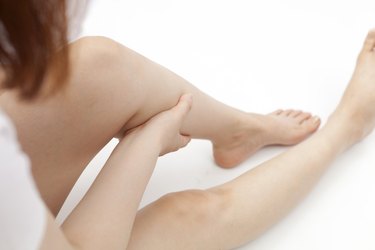
Muscle cramps, or charley horses, cause sudden, intense pain that temporarily makes your calf muscle feel as if it's locked in place. Although the cramp eventually subsides, soreness may remain as an unpleasant reminder. Some gentle stretching and cold or heat application typically helps resolve lingering pain after a charley horse.
What Is a Muscle Cramp?
Video of the Day
Muscle cramps occur when your muscle contracts involuntarily and remains in the contracted position. Calf muscle cramps are among the most common type of muscle cramps, reports the American Academy of Orthopaedic Surgeons.
Video of the Day
A cramped muscle may feel hard to the touch, and you may notice that the muscle looks distorted or twitches under the skin. Cramps can last a few seconds or up to 15 minutes. In some cases cramps may occur in groups, with another cramp occurring just after one subsides.
Pain in Calf After Cramp
When you experience a cramp, you should immediately cease the activity that caused it. Then gently stretch the muscle by flexing and pointing your feet or doing a calf stretch against the wall. You can also gently massage your calf with your fingers to relax the muscle.
Applying heat from a heating pad or warm bath immediately after the cramp can help relax the tight muscles. You can apply ice to the area for 10 minutes at a time to help dull pain receptors and reduce pain if you have prolonged soreness after a leg cramp.
Over-the-counter pain medications, such as ibuprofen or acetaminophen, may also provide temporary relief of pain.
Avoiding Calf Cramps
Poor conditioning and inadequate stretching and warm up before exercise are thought to be the main causes of muscle cramps. You can prevent further cramps by getting into good shape and always stretching before exercise.
Not only should you stretch your calf muscles, but you should also stretch your hamstrings, quadriceps and glutes, as tightness in any of those muscles can also contribute to calf muscle cramps.
Staying hydrated during exposure to heat and humidity, especially while exercising, can help you avoid cramps and the resulting muscle pain. Fluids lost during sweating can cause dehydration, a common cause of cramps.
Overuse of your calf muscle during exercise can cause leg cramps at night. Unless you are well-conditioned, avoid prolonged repetitive activities that involve your calf muscle — such as endurance running or jumping rope.
Also, wearing supportive footwear, especially if you have flat feet or other structural issues, can reduce the risk of leg cramps.
Warnings and Precautions
While lingering pain after a charley horse isn't usually a sign of a serious medical condition, in rare cases it can be a symptom of a potentially life-threatening condition called deep vein thrombosis.
Deep vein thrombosis occurs when a blood clot forms deep in a vein. Symptoms of deep vein thrombosis include leg pain and swelling. You may notice that the skin over the painful area feels warm or looks red or blue.
If you suspect that you may have a deep vein thrombosis, seek emergency medical care. Blood clots in the leg are particularly dangerous because they can be fatal if they travel through your bloodstream to your lungs.